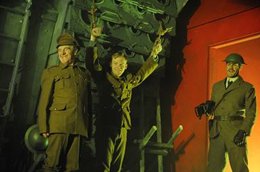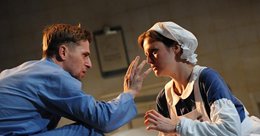One of the more memorable moments in Druid’s epic production of Sean O’Casey’s first World War lament The Silver Tassie, has nothing to do with battle. In the beginning of the final act, Sylvester Heegan (Eamon Morrissey) and Simon Norton (John Olohan) are enjoying some banter at a dance in honour of Irish World War veterans when a phone rings. The duo is frightened at first, and then both thwarted in their attempts to communicate with the voice inside the machine. The caller and his message are never known and the drama quickly returns to O’Casey’s central task: relentlessly attacking the Great War through poetry, song and dance.
 The voices of the Irishmen who survived the horrors of the first World War remained largely silent throughout the foundational years of the Irish state, despite O’Casey’s vengeful efforts here. Audiences expecting an austere rendering of this epic from Druid are in for a bodyblow; what is created is something closer to shock and awe. The appearance of an incredibly large military tank at the start of Act Two, followed by the rotation of its cannon arm over the first few rows of the theatre, will go down as one of the most dramatic moments in this or any other Irish theatre calendar. It is a brave director who would unveil a war horse of such grandeur during these recessionary times, but Garry Hynes shows an unflinching commitment to projecting O’Casey’s bleak drama onto the grandest possible scale. Anchored by a bold combat scene, complete with a tempest, that imagines war as an elemental death dirge, Druid’s production sometimes feels like a monumental gesture of apology to O’Casey for Yeats’s notorious initial rejection of his play while director of the Abbey in 1928.
The voices of the Irishmen who survived the horrors of the first World War remained largely silent throughout the foundational years of the Irish state, despite O’Casey’s vengeful efforts here. Audiences expecting an austere rendering of this epic from Druid are in for a bodyblow; what is created is something closer to shock and awe. The appearance of an incredibly large military tank at the start of Act Two, followed by the rotation of its cannon arm over the first few rows of the theatre, will go down as one of the most dramatic moments in this or any other Irish theatre calendar. It is a brave director who would unveil a war horse of such grandeur during these recessionary times, but Garry Hynes shows an unflinching commitment to projecting O’Casey’s bleak drama onto the grandest possible scale. Anchored by a bold combat scene, complete with a tempest, that imagines war as an elemental death dirge, Druid’s production sometimes feels like a monumental gesture of apology to O’Casey for Yeats’s notorious initial rejection of his play while director of the Abbey in 1928.
One assumes O'Casey would be quietly pleased. The curtain opens to a quayside apartment in inner-city Dublin. It is not a common depiction of tenement life: instead of the teeming claustrophobia, Francis O’Connor’s set is eerily spacious and framed by high, blood-red walls. When Sylvester and Simon are not recounting old fistfights, over the prostelytising protests of Susie Monican (Clare Dunne), their thoughts are with Harry Heegan (Aaron Monaghan). He and his friends are both teammates in a cup final being contested and brothers in arms for Britain, set to depart for the front lines on the night in question. Harry eventually returns home with two trophies, the silver tassie itself in one hand and his lover Jessie Taite (Aoife Duffin) in tow, though both are scant consolation for the cruelties that await him
 Considering the contested historical legacy of Ireland’s involvement in the first World War and the playwright’s own body of work, O’Casey is surprisingly disinterested in writing - or rewriting - history. Instead he fixates on the wounds, both visible and psychic, of combat. Druid’s production is based largely on O’Casey’s 1949 revision of the text, which carries added venom from the realisation that The War To End All Wars was just a dress rehearsal. As such, subtlety is a weapon hardly wielded by O’Casey and the more awkward interactions are the most overt ones, such as the pious pronunciations of Sister of the Ward (Ruth Hegarty) in Act 3’s hospital scene.
Considering the contested historical legacy of Ireland’s involvement in the first World War and the playwright’s own body of work, O’Casey is surprisingly disinterested in writing - or rewriting - history. Instead he fixates on the wounds, both visible and psychic, of combat. Druid’s production is based largely on O’Casey’s 1949 revision of the text, which carries added venom from the realisation that The War To End All Wars was just a dress rehearsal. As such, subtlety is a weapon hardly wielded by O’Casey and the more awkward interactions are the most overt ones, such as the pious pronunciations of Sister of the Ward (Ruth Hegarty) in Act 3’s hospital scene.
Yet if O’Casey’s writing sometimes seems blinded by angst, Druid has enlisted a large, muscular artistic team to smooth out the script’s rough edges. Elliot Davis’s original music provides an elegiac lilt to O’Casey’s rousing songs, while movement directors David Bolger of Coiscéim and Vanessa Lefrancois help animate the large cast, most strikingly during the battle scene, as the soldiers entangle, collapse onto each other and rise again. And given the play’s four distinct sets and the loading and unloading of the enormous tank, this two-and-a-half hour production is buoyed by heroic feats of stage management.
Maureen Hughes’s casting is assured, with Morrissey and Olohan's whistling-past-the-graveyard schtick becoming more engaging as the mood darkens, and Dunne always lurking in the background as their foil. And while not the most confident singer, Druid stalwart Aaron Monaghan is immense as the primary vessel of both O’Casey’s rage and potent poetry.
Yeats based part of his refusal of The Silver Tassie on O’Casey’s lack of direct experience of combat. “You never stood on its battlefields or walked its hospitals”, he wrote to O’Casey. This seems like an odd quibble. This is a not a play about the mechanics of war; it is an exposition of its trauma for those who endured it. As a Dubliner, O’Casey would have witnessed the destroyed bodies and minds of the returned firsthand. Druid’s definitive production of The Silver Tassie succeeds by opening those wounds again.
Donald Mahoney is a writer and journalist based in Leitrim.